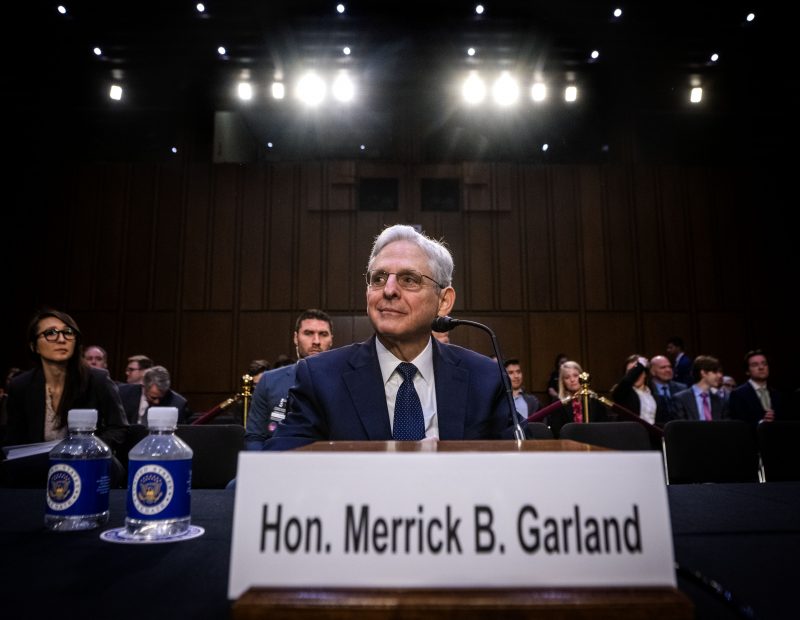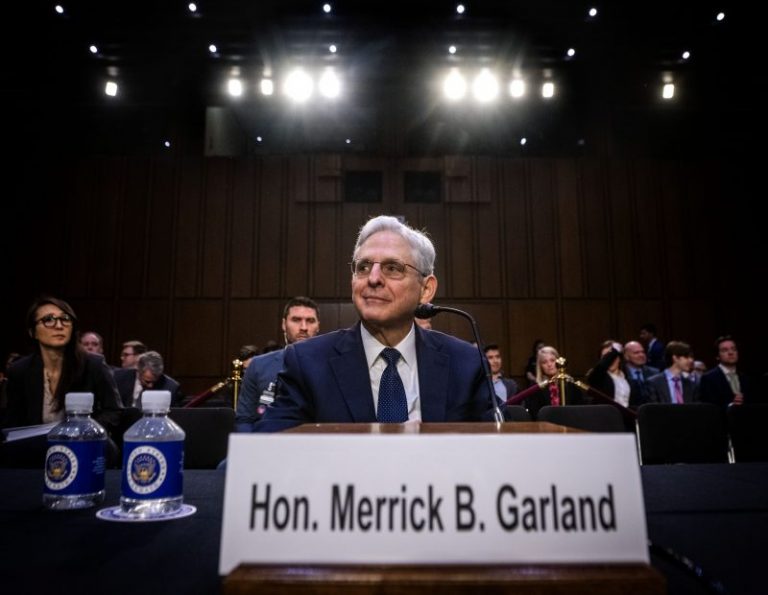
Merrick B. Garland, whose mission as attorney general has included depoliticizing the Justice Department, is now seeing it prosecute a former president for the first time, an action that presents an extraordinary test for the soft-spoken former judge.
Former president Donald Trump said Thursday night that he has been charged in connection with the discovery that hundreds of classified documents were taken to his Mar-a-Lago home after he left the White House.
A seven-count indictment includes criminal charges of willful retention of national defense secrets, obstruction of justice and conspiracy, according to people familiar with the matter who spoke on the condition of anonymity to describe a case that has yet to be unsealed. The charges carry the potential of years in prison if Trump is found guilty.
While the case was assembled by special counsel Jack Smith, Garland, who was appointed by President Biden, retained the ultimate authority on what to do with the evidence against Trump. Trump and his allies wasted little time in accusing Garland of having “weaponized” the Justice Department against the former Republican president.
“If the president in power can just jail his political opponents, which is what Joe Biden is trying to do” then “we don’t have a republic anymore,” Sen. Josh Hawley (D-Mo.) said Thursday night on Fox News, echoing Republican critics of Trump’s prosecution.
Garland, 70, arrived on the job in 2021 after years of debilitating public debates on how the Justice Department investigated political cases during the Trump administration. Critics accused Trump of treating the department as his personal law firm rather than an independent department and using it to target his political foes and exonerate his friends.
Ongoing investigations involving Donald Trump
1/7
End of carousel
Upon taking office, Garland, a former appeals court judge for the District of Columbia, immediately found himself having to navigate high-profile issues that were inherently political, including the Jan. 6, 2021, attack on the Capitol, a congressional investigation of Trump’s efforts to undo the 2020 election results and partisan battles over elections and civil rights.
A year into the job, Garland told reporters that he was committed to avoiding “any partisan element of our decision-making about cases.” At the same time, he said, the department does not “shy away from cases that are controversial or sensitive or political. To do that would undermine an element of the rule of law.”
Early in his tenure as attorney general, his critics included Democrats who said he was moving too slowly to investigate Trump, particularly related to his actions ahead of the Jan. 6 attack by his supporters. Last November, Garland named Smith to oversee the criminal probe of Trump’s possible mishandling of classified documents at his Florida home and key aspects of the sprawling Jan. 6 case, acknowledging the political sensitivity of investigating a former president who was again seeking office.
The appointment of Smith, a longtime federal prosecutor who had in recent years been working at the International Criminal Court at The Hague, came three days after Trump formally declared himself a 2024 candidate for president. At the time, Garland said “extraordinary circumstances,” namely Trump’s candidacy and Biden’s stated intention to run for reelection, necessitated the appointment of an independent prosecutor to oversee the investigations.
“Based on recent developments, including the former president’s announcement he is a candidate for president in the next election, and the sitting president’s stated intention to be a candidate as well, I have concluded that it is in the public interest to appoint a special counsel,” Garland said, pledging that Smith would handle the investigations in “an evenhanded and urgent manner.”
Before and after Smith’s appointment, Garland has largely remained publicly silent about the Trump documents case. Last August, he confirmed that he had signed off on an FBI search of Mar-a-Lago, but otherwise he has only said that prosecutors would be guided by the facts.
Before his nomination as attorney general, Garland was perhaps best known for being nominated to the Supreme Court in 2016 by President Barack Obama, a nomination that went nowhere because Senate Republicans refused to give him a hearing. The opening on the high court was eventually filled the following year by Trump’s choice, Neil M. Gorsuch.
History of investigations involving Donald Trump
1/7
End of carousel
Upon Biden’s announcement of his nominee, Democratic lawyers saw Garland as an inspired choice to repair the Justice Department’s credibility following the Trump years. Karen L. Dunn, a federal former prosecutor who once clerked for Garland, called him “the perfect choice for this job.”
“He will restore independence and integrity to the Justice Department, be the people’s lawyer, not the president’s lawyer, and will come in with the respect of the career public servant who advances the cause of justice every day,” Dunn told The Washington Post.
Garland was nominated to the appeals court in 1997 by President Bill Clinton after a stint as a senior Justice Department official in which he oversaw the prosecution of the 1995 bombing of the federal building in Oklahoma City that killed 168 people. He also oversaw the prosecution of Theodore Kaczynski, the Unabomber who eluded authorities for years while mailing bombs to people.
Given his record, even some Republicans praised Biden’s choice of Garland to lead the Justice Department. At the time, Sen. Lindsey O. Graham (R-S.C.) called Garland a “sound choice to be the next attorney general,” adding, “he is a man of great character, integrity and tremendous competency in the law.”
Devlin Barrett, Perry Stein, Matt Zapotosky, David Nakamura and Ann E. Marimow contributed to this report.


Comments are closed.